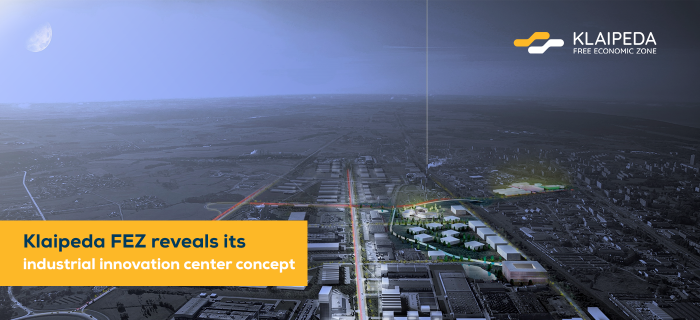News & Events
Watch our activity in one place
Klaipėda FEZ’s vision for Industrial Innovation Competence Centre

The management company of Klaipėda Free Economic Zone (FEZ) is proposing to set up and develop an Industrial Innovation Competence Centre (IICC) in the Zone’s territory within the next decade. The project would help the manufacturing businesses operating in the FEZ familiarise themselves with the latest digitalization, automation and other technologies as well as provide opportunities for trialing them in practice. However, whether this project can be implemented and how long it would take depends on available financing sources.
High added-value economies of both Klaipėda and Lithuania as a whole are heavily dependent on how smart and efficient production businesses operating here are. The Lithuanian Confederation of Industrialists estimates that over the last decade Lithuania continued to be one of the outsiders in Europe in terms of the ratio between pay and increase in productivity. This means that Lithuanian salaries have been rising much more rapidly than the value created by the country’s workforce which increases the risk of Lithuania losing its competitiveness.
In order to strengthen Lithuania’s ability to compete as well as increase its investment attractiveness, traditional industry which makes use of the latest smart, efficient and automated technologies is very important. In addition, favourable conditions should be created for new production enterprises which are based on technologies and research.
One of the initiatives to help achieve this goal was presented by the management of Klaipėda FEZ last Friday during the event called “Partnership – the Future of Klaipėda’s Industry”. The Zone’s management company are looking for opportunities to set up a competence centre and a manufacturing facility for training purposes within the territory of the FEZ.
“Manufacturing firms are, of course, keen to digitalise but it is a bigger challenge than it may seem. “Real-life” cases of digitalised industry are still not readily accessible to businesses, the benefits of investing into “Industry 4.0” technologies are also not very clear, while the manufacturers themselves lack competencies and appropriate coordination. On top of that, there are cyber-security concerns and other challenges to consider. We would be able to address these difficulties at our IICC. The centre would introduce the latest technologies to the FEZ companies, each of which would have an opportunity to discuss their goals and capacities with the industry experts, to plan and implement various digitalization projects together as well as prototype, test and learn,” says Tadas Kubilius, project manager at Klaipėda FEZ.
Kubilius explains that the IICC would bring together companies and organizations of varying sizes – from “large” competence and technology partners (technology creators, universities, research organizations, etc.), which could showcase their technological solutions, to manufacturing firms of different sizes which could get consultations at the Centre, they would be able to experiment, plan and implement innovations in areas such as digitalization. The IICC would also be open to industrial start-ups which will have access to unique technological base as well as a great deal of knowledge and experience from widely-known industrial businesses.
According to Klaipėda FEZ, the main focus of the IICC would be industrial sectors such as smart energy, water processing technologies, logistics and plastics manufacturing, while the Centre itself would be open to both current and future customers of the Zone as well as businesses from Klaipėda region, Lithuania and other Baltic States.
The IICC would perform many “hard” and “soft” functions, such as auditing and consulting businesses, helping them plan and implement digitalization projects, offering practical training and making the training facilities available for technology education and competence improvement, encouraging exchange of ideas and competencies, supporting industrial start-ups, facilitating prototypes and demonstrations.
The IICC would be located in a building or a complex of buildings in the Western section of the FEZ with a possibility for modern offices and other innovation spaces to develop around the Centre in the future.
According to Eimantas Kiudulas, CEO of Klaipėda FEZ management company, discussions with potential international partners (universities and businesses operating similar competence centres) are ongoing. However, taking this idea forward is only possible once external financing is secured.
“We are convinced that this project goes hand in hand with the strategic goals of Klaipėda and Lithuania to focus on higher value added. This involves both creating innovations from scratch and modernising the existing ecosystem by opening new possibilities. We are very excited to present our vision and we hope that it will attract the support and the partnerships needed to take it forward,” says Kiudulas.
A similar initiative was presented during the event by the operators of Klaipėda’s co-working and office space hub Lighthouse, which is planning to expand its digital innovation centre to include prototyping infrastructure. It would offer services such as 3D printing, automation, digital design, material processing, IT labs and others.
